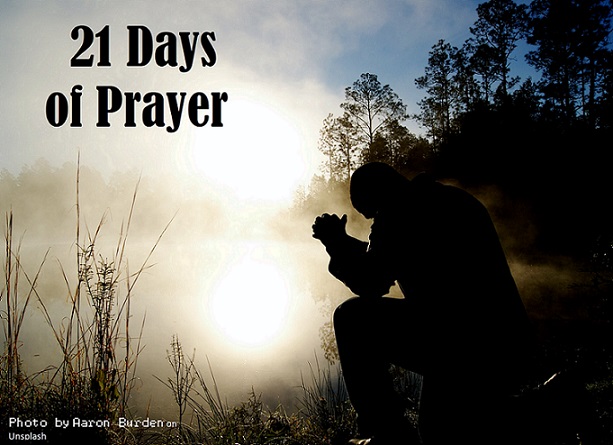Day Fourteen: How to pray unceasingly?
Scripture: 1 Thessalonians 5:17
Principle: Prayer is perpetual.
In 1 Thessalonians 5, Paul gives the church a list of 15 imperatives. A list of things they should and shouldn’t be doing. In the middle of the list he tells them to pray without ceasing. What does he really want us to do and how do we do it?
It seems like an impossibility to pray continually. We have lives to live. We have to eat, sleep, go to work, spend time with family and what about rest and relaxation? There is barely time to pray at all yet he wants us to pray unceasingly. According to Charles Surgeon, it means first that we have the privilege to pray at any time. We do not have to wait for a specific time or be in a specific place to bring our prayers to God. It’s not like going to see your doctor. You don’t have to have an appointment and you don’t have to go to the doctor’s office. You don’t have the same access to your doctor that you do with God. It is our privilege to have 24/7/365 access to God through prayer. It also means that our posture and voice are not important. If we are to work and pray simultaneously, we cannot be in a meeting on our knees praying out loud.
So how are we to accomplish this task.? First,
“Let all your actions be consistent with your prayers, and be in fact a continuation of your prayers.”27
Second, always be in a spirit of prayer. In other words, let prayer be your default. Let it be the thing you always return to. When you get a new electronic device, like a computer or tablet or phone, it is fast and works great. Over time it slows down and begins to have glitches and crashes. One of the things you can do is restore it to its factory default. Prayer should be our factory default. Regardless of our circumstances, prayer should be our default—the thing we return to over and over again. That is what it means to always be in a spirit of prayer.
Third, between times of dedicated prayer, strive to pray short spontaneous prayers as you go about your daily routine. Remember, prayers don’t have to be audible, or long, they just have to come from a heart that desires to be near to God.
Application: Spurgeon says,
“He who prays without ceasing uses many little darts and hand-grenades of godly desire, which he casts forth at every available interval.”28
Today make a conscious effort to be in perpetual prayer. Use every available moment to throw hand grenades of godly desire.
27C. H. Spurgeon, “‘Pray without Ceasing,’” in The Metropolitan Tabernacle Pulpit Sermons, vol. 18 (London: Passmore & Alabaster, 1872), 139.
28 Spurgeon, 138.

